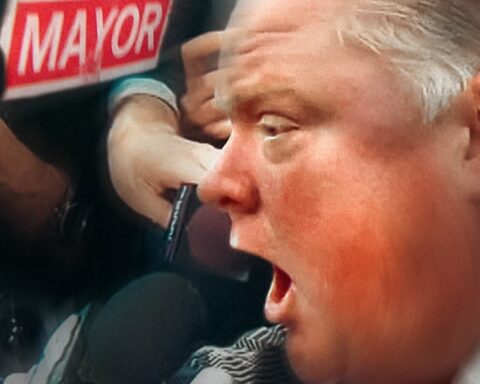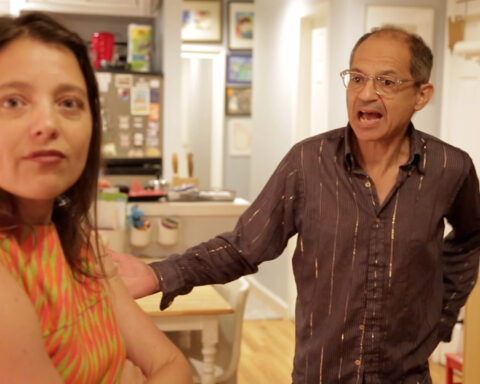Meuthen’s Party
(Germany, 92 min.)
Dir. Marc Eberhardt
Programme: Deocrazy (International Premiere)
“Ah crap,” is a fitting opener for a film that follows a representative of the new, or just more respectably packaged, German right. Even if it is uttered by one of its representatives looking for his keys while struggling to get his party’s campaign posters out of his sensible economy car to plaster across a small town at dusk. (The right are early risers, as we see throughout the film). It is our luck that student filmmaker Marc Eberhardt did not fall for right-wing honey trap front woman and the titular Herr Meuthen’s big rival, super hardliner Frauke Petry (of New Yorker portrait infamy). Thus Meuthen’s Party, not Petry’s Party, is showing the party’s broader face at Toronto’s Hot Docs Film Festival days after its world premiere at Documentary Film Week Hamburg.
The opening sequence establishes what you need to know about the party base of the AfD (Alternative for Germany) as they push their way up from the bottom, starting where Adolf Hitler began, in the beer halls. They’re male, petit bourgeois, mansplaining the world to their brothers-in-arms, at a camera or to no one in particular, over-estimating their own genius (“This poster is my brain child.”). Just nerve grating or actually immanently dangerous? 31-year-old Eberhardt, fresh out of Film Academy Ludwigsburg, gives you ample information to create your own bio-pic, and plenty of subtext to make up your own mind.
You have to listen closely to catch all the important bits of information, starting before we meet Meuthen, the party’s big man. For example, how were some now extreme right wingers socialised from the left Green party? Were they natural “party hoppers,” as one comrade remarks, or is this phenomenon one of “consistent development” as ‘Hans-Guido’ insists? Meuthen brings this curious link up later, when, worried about crowd security and protesters, he jokes: “I’ll put my hood up and look like a Green party member,” which indeed he does.
Jörg Meuthen, the middle-aged, grey-haired, spectacled economics professor, is presented largely through his own actions and words. There is little commentary on Meuthen by others and no interviews. All this makes for good documentary filmmaking and a sensitive anatomy of a demagogue, but it will challenge international audiences, who will lack Germany’s political context. He plays the reasonable, moderate, intelligent, rational candidate, stating in a radio interview that his party is being “misinterpreted” or “misunderstood” by critical journalists wrongly focusing on single outrageous statements while not giving leeway for unfortunate “tone of voice or choice of words.” Explaining a colleague’s pro-Nazi gaffe, he admits, “I could have said that too. I just wouldn’t have authorized it for publication.” Meuthen apparently deplores his openly fascist colleagues in form more than in content—-although he is on record saying that anti-Semitism has no place in the AfD.
Does he not see himself tempting fate while talking publically, so blinded by the promise of influence and power? Throughout, one wonders why Meuthen agreed to this “little film,” as he talks to a journalist who crosses his path, with the unique patronizing “humour” and mock modesty of a 55-year-old European male. I fear that he might be right in assuming that enough people find him placating and endearing.
From the beginning, he has that one trait that every politician needs: He relates to people (“I’m with you”), not giving speeches but vox pop Q&As, seemingly guided by the audience but somehow always circling back to his favourite topics: austerity, unemployment, security. A proud postering guy at the beginning of the film involuntarily encapsulated the populist right’s attraction and biggest challenge: “It’s the attempt to break down a complex problem into a simple slogan. It remains an attempt.” How to grow a populist movement 101.
Many of the scenes could not be more stereotypical if this was a fiction film. Hefty men are shown eating dumplings and sauerkraut in a traditional wood-paneled guest house, giggling at their ineptitude to put on buttons that read “stop asylum chaos.” Meuthen does the rounds talking about “Dexit”, the would-be nickname for Germany’s exit from the EU if it was on the table. Not that the audience needs much warm-up to understand what they’re all about: anti-immigrant, anti-EU, pro-conservative “values”. Facts are in short supply, opining and emoting abounds in Meuthen’s “citizen conversations,” which stand in stark contrast to the party’s campaign slogan “Sense and reason instead of ideology.” Meuthen doesn’t need to sow fear: he’s already here to reap; like all populists, his success is dependent on good timing.
Things are not all obvious and straightforward though. Meuthen, who does not know Germany’s most basic voting rules such as entering the ballot booth alone, finds himself the leader of the official opposition in his province (which is headed by a Green premier). An old man yells at Meuthen in the street: “You’re a disgrace for Germany!” At the same time, an agitated younger man, neatly suited and self-identifying as a “foreigner,” explains why refugees are dangerous and why he would vote fascist and even leave Germany himself if it helped the country he loves so much stay ‘German.’ “What was that? That was weird,” is Meuthen’s laughing reaction when the man has left. It’s a genie-out-of-the-bottle moment, taken to absurdity.
The film’s narrative arch begins with excitement building from small party base work to nervous anticipation of the first TV debate to the victory party and on to Meuthen stepping onto the federal party scene. When Meuthen seems out-righted by his own party (there’s a back story of him launching a moderate mutiny once, not referenced in the film), he tries to curry favour, barking louder, suddenly sprinkling his speeches with the usual rhetoric and wagging fingers of unsubstantiated threats towards vague enemies. A fire starter, a wolf in sheep’s clothing (with the Big Bad Wolf, Frauke Petry, in the wings if you look closely).
Eberhardt intervenes very rarely; he mostly holds the rope for Meuthen to hang himself. But when he does, he smartly goes for the jugular; for example. asking Meuthen’s driver-assistant Herr Schweter what his sources are when he does research for Herr Meuthen. “The Internet and the talk of the town,” is his pleased answer. Overall, Eberhard makes the most of his great luck, or strategic gamble, that the jovial, joking Meuthen has let him in to film this doc.
Whether subtlety is a good enough strategy to change the non-converted through the film’s revelations about how the far right is sneaking into the mainstream is open for debate. The filmmaker certainly doesn’t have to look far for telling images or sound bites. His merit is what he makes of his access and material. Visually, the images are often more obscured than clear—Meuthen seen behind other people’s heads or through milky radio studio windows. The camera work mirrors Meuthen’s character: partially hidden, foggy at times, apparently part of the crowd, and every now and then teasing out an unintentional irony.
Once, Meuthen has trouble getting into his own event for all the security outside. Eventually, his bodyguard (with a strong Balkan accent) muscles them in. Another time, he is seemingly unaware of the location while speaking in front of a plaque commemorating a Nazi dissident. Bach’s masses as well as music by Verdi and Mozart thankfully drown out some of the party meeting ramblings, leaving us to ponder the pure spectacle of hyperbolic right-wing rallies. The party’s federal congress is a democratic farce, with people randomly waving voting cards before the exasperated speaker has even put out the proposal. It eerily recalls the chaos of the late Weimar Republic, before the Nazis really got their house in order. Only once was I sorry to see the subtitles truncate a speaker’s story: “Immigration countries actually only exist when the native people —like in Canada or elsewhere— are exterminated. Germany hasn’t quite come this far,” fantastically likening Germans to embattled Indigenous peoples.
A riveting thriller this ain’t. It won’t leave you all fired up, but rather sick and worried, with eyes and ears better trained for the seeping, creeping ascent of the European right. The film joins the ranks of other political process analyses, with such accomplished documentaries as Democracy and We Can’t Make the Same Mistake Twice. There is lots of campaign driving and talking about driving, bringing to mind Hannah Arendt’s insights into the banality of evil, the haphazardness and pedestrian machinations of populist movements. Even if you miss the specific cultural background, some of it will sound familiar, like calls to exclude homosexuality from the sex ed curriculum. Germany goes to the polls in September and the AfD is currently at 9% federally, not as big a number as neighbouring right-wing movements but still making it the third largest party in a fractured field. As we watch Meuthen’s Party, Germany is bracing for the AfD’s first entry into the federal Parliament.
Eberhardt shows us the early warning signals. “Something is happening in Germany!” Meuthen proclaims. Feel free to read it as a threat. As the popular German protest slogan goes: Let it not take root. We won’t be able to say we didn’t see this one coming.











